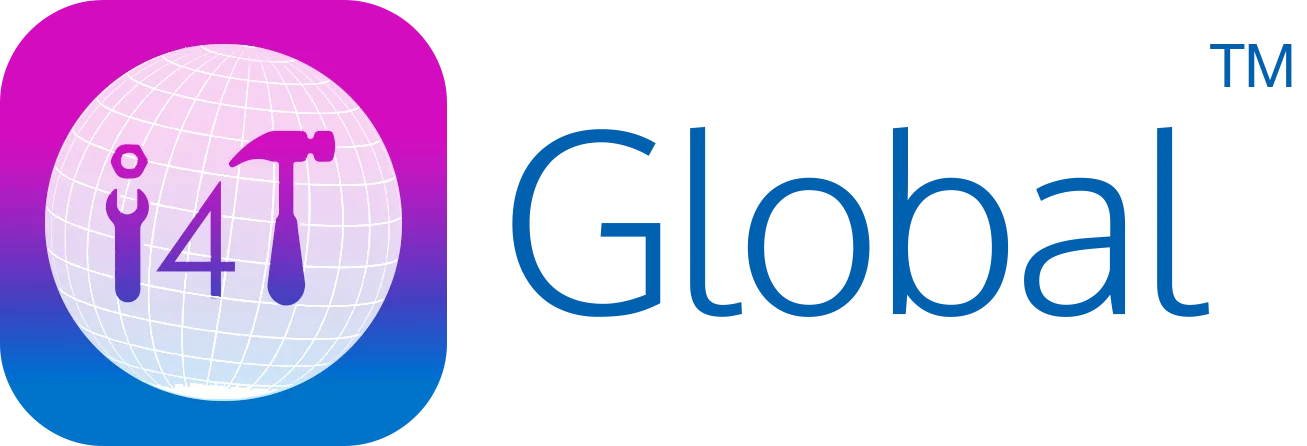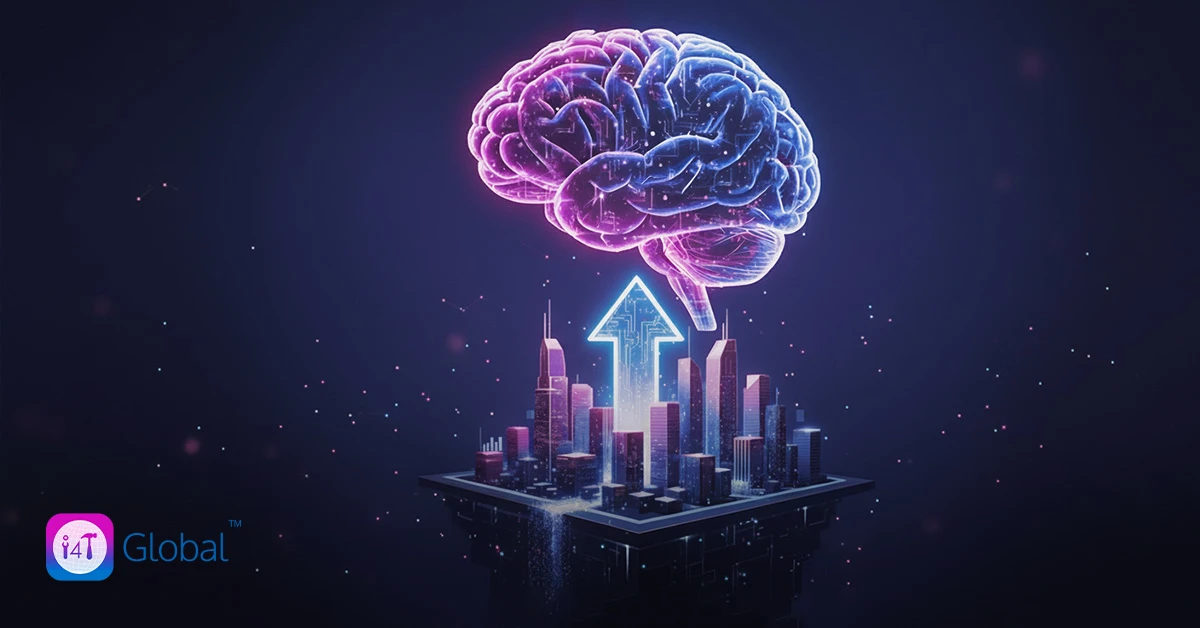Of course back then, the Internet digitally connected businesses to their customers via websites. As the digital aspirations expanded rapidly, many organizations were required to manage new Social and Web Platforms.
As a Digital Transformation Specialist and Founder & CEO of i4T Global, I would say companies started to rely on Digital Platforms and different Digital Approaches, hoping to make better use of data, develop more transparency, and remain competitive in the marketplace.
Understandably, instead of using the conventional business model through layered systems, companies began to implement digital methods and practices in more actionable steps, which then affected bigger (and better) transformation throughout the company.
Digitalisation enables us to have more choices than we’ve ever had before, but it also requires us to think out of the box and embrace innovation
Hereby, I thought of sharing my take on how we can move forward with Digital Transformation during this unpredictable tough time that all of us are going through right now! The COVID-19 Pandemic has not only triggered us physically but also emotionally making a significant impact on our mental health.
As a Serial Entrepreneur & Angel Investor, I’m delighted to share some inspiring Digital Transformation lessons that can be applied to any labour-intensive SMEs that intend to reimagine its vision through a digital lens, specifically in Australia’s Economic Sector where I’m part of. I hope you’re curious to learn more about it as I am.
Riding the Digital Transformation Wave
First of all, I would like to highlight what Hon Jane Hume, the Parliament Minister of Australia for Financial Services and the Digital Economy said during the discussion of Australia’s Digital Economy Strategy. “Digital Transformation is key to securing our economic future and recovery from COVID-19. Our Digital Economy Strategy targets investments that will underpin improvements in jobs, productivity and makes Australia’s economy more resilient” she said.
The purpose of me outlining this here is for us to picture what future Australia holds for us and what more could we expect. The pace and magnitude of change or transformation may vary significantly from industry to industry in each sector. However, we can clearly see fundamental changes underway.
These changes affect how companies engage with their customers, develop and deliver products and services, and how they plan for and shape their Business Models and Workforce. We see a mountain of opportunities, for consumers, businesses and Government alike, as the adopt the change brought forward by the “Fourth Industrial Revolution”
In this article, I have defined the term “DIGITAL” broadly as a set of technologies that provides immense opportunities in innovating business models, product offerings, and markets; growing existing revenue streams, and enhancing the customer experience through improved customer interactions and service; and streamlining internal processes and operations.
According to this broad definition, Digital is more than just IT Infrastructure, nor is it limited to online presence, but rather an integrated set of opportunities leveraging technologies ranging from Automation, the Internet of Things, and Advanced Analytics, to Agile Methodologies and Customer-Centric Product and User Experience Design.
Therefore it is more appropriate to say that, Digitally Enabled Innovations are creating opportunities and disrupting Business Models across all sectors of our economy. In other words,
Emerging Technologies and New Working Patterns are Transforming the Nature of Work and, in the Long Term, Reshaping the Australian & Global Economies
Industry 4.0 and How Does it Work?
The Fourth Industrial Revolution, 4IR, or Industry 4.0, conceptualises rapid change to Technology, Industries, and Societal Patterns and Processes in the 21st Century due to increasing connectivity between devices and Smart Automation. – Wikipedia
Industry 4.0 is built on nine technology pillars which are;
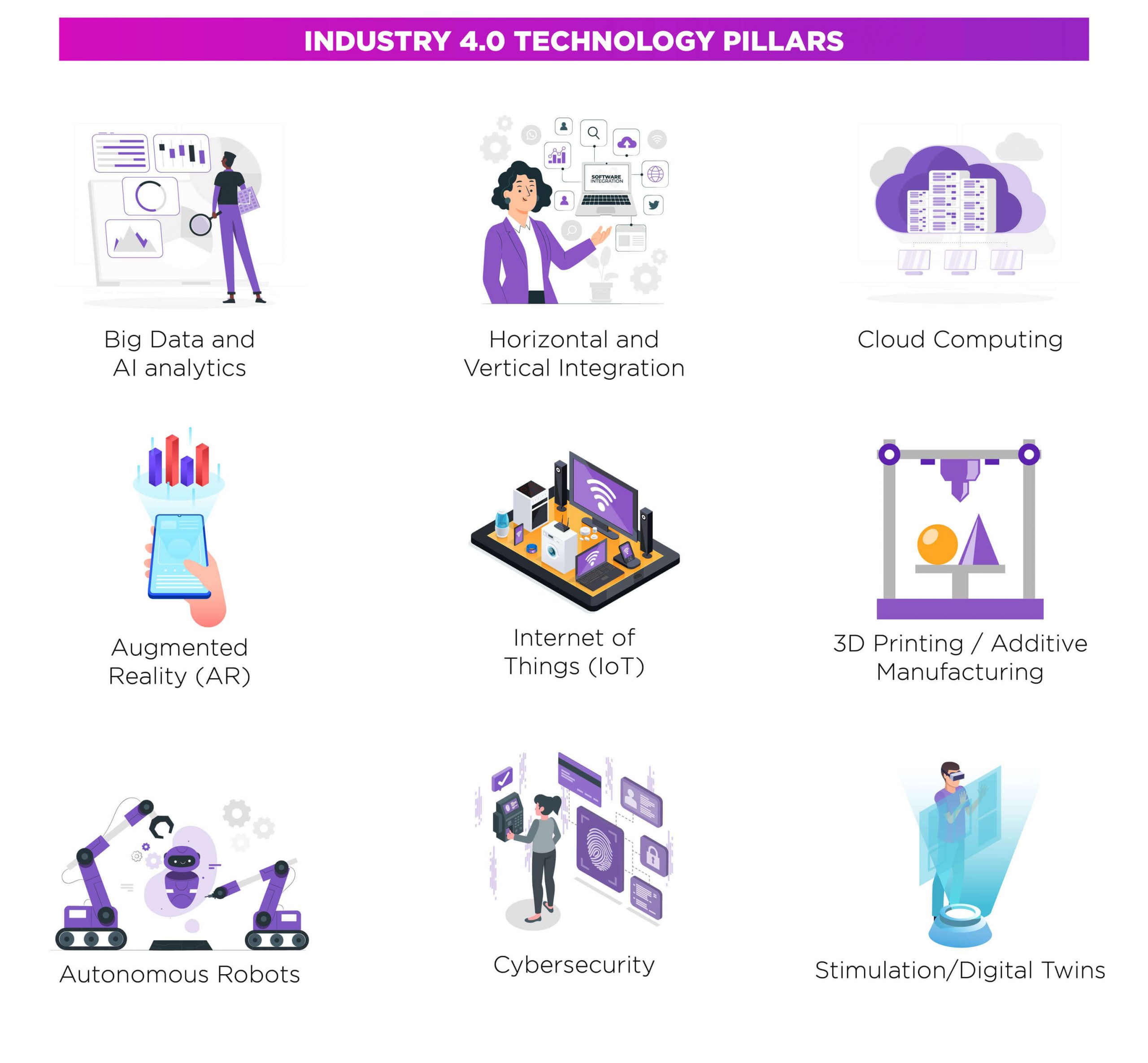
- Big Data and AI analytics
- Horizontal and Vertical Integration
- Cloud Computing
- Augmented Reality (AR)
- Internet of Things (IoT)
- Autonomous Robots
- Cybersecurity
- Stimulation/Digital Twins
Australia’s Digital Economy Vision
To be a Leading Digital Economy & Society by 2030
- Australian Community : By 2030, all Australians will have access to digital skills and technology to ensure inclusivity.
- Australian Business : By 2030, all businesses will be digital businesses. Businesses, including SMEs and the not-for-profit sector, have the confidence and capacity to invest and participate in the digital economy.
- Australian Government : By 2030, Government service delivery will be frictionless and integrated with technology making life easier. The Australian Government will lead in the efficient, trusted, and secure delivery of services to Australians online.
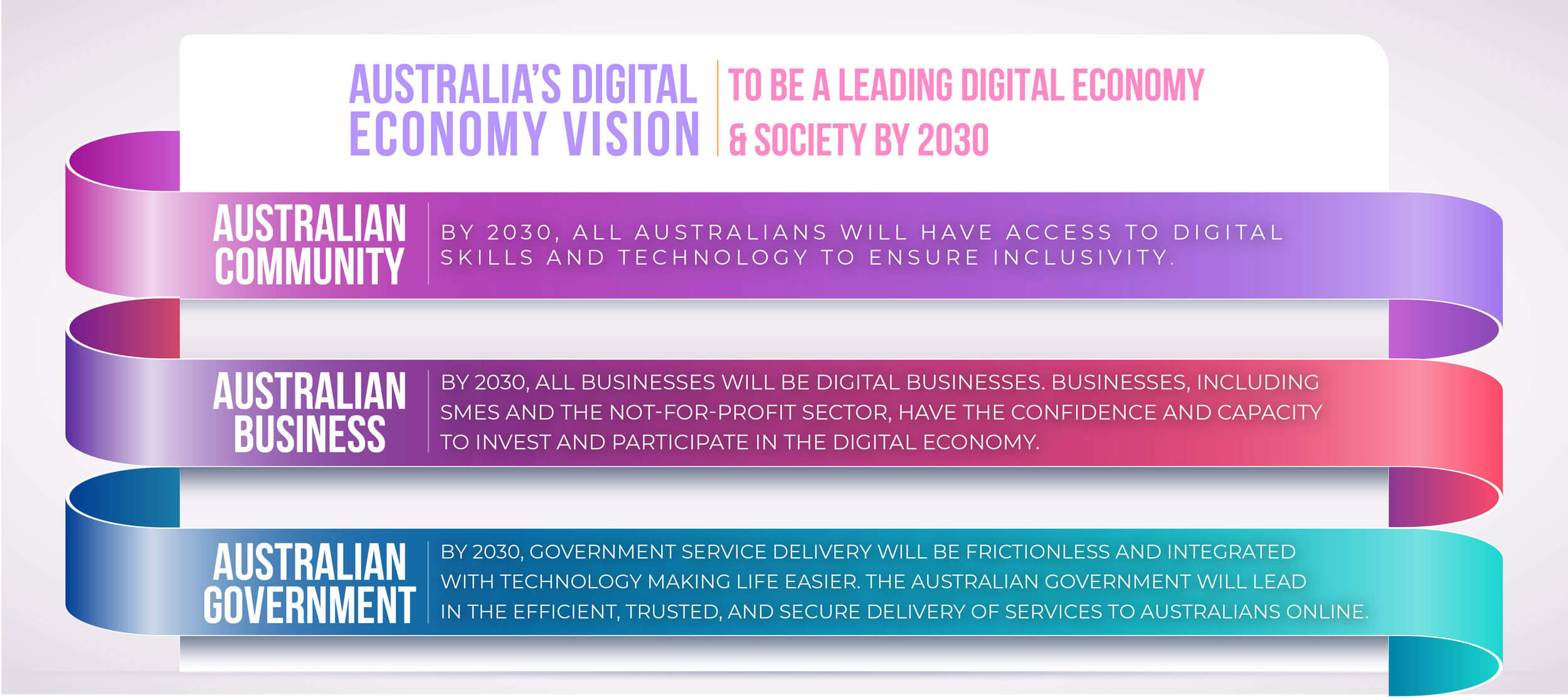
- Source Australia’s Digital Economy
- Over the last five years, Australia’s Digital Growth has more than doubled; however, particularly Asset-Intensive Australian Sectors continue to have a lower level of Digitisation than their counterparts in the United States.
- Digital Innovation is rapidly growing and is causing inevitable disruption. This is also resulting in new opportunities for those who are fast enough to grab the advantages before others.
- It would be safe to say that Digital would soon be the sole reason for more productivity and economic uplist, contributing between A$140 billion and A$250 billion to Australia’s GDP by 2025.
The Success Formula for Australian Companies to Digitally Transform
Digital Transformation was on corporate Australia’s Agenda even before COVID-19 Pandemic, to improve customer experiences and drive productivity and innovation. But the Economy has made digital performance an absolute imperative.
Now let’s move on to the next section right away. As previously said, I have discovered the Opportunities (and Threats) from Digital in depth across seven key sectors of the Australian Economy: the Public Sector, Healthcare, Retail, the Arts and Culture, Banking and Insurance, Mining, Utilities, and Property Management. In each section, I will be talking about not just the Digital Levers having the highest potential but also what needs to be done by the stakeholders to make the most of it.
Public Sector
The Australian Government has plenty of impactful Digital Initiatives in place. Simply by digitising the government-citizen interactions, including direct activities as well as backend support, the public sector can improve efficiencies by 4% to 15%. Not just this, but these efficiency gains will turn to revenue gains and also facilitate better policy making by Advanced Analytics.
Capturing the opportunity will necessarily require continued investment in National Digital Literacy, as well as the Recruitment of New Skill Sets into Public Sector Roles.
Healthcare
By Automating and Simplifying Processes, Enhancing Connectivity, and Real-time Reporting and Advanced Analytics, Australia’s Annual Healthcare Expenditure could be shrinked by at least 8% to 12%. What’s even more exciting is the possibility of greatly improving service quality in the process. Needless to say, to make the most of these opportunities good collaboration is called for between Individual Providers and the Government.
Retail Sector
Despite significant progress in recent years, Australia’s Retail Sector lags behind International Peers in terms of Digital Maturity, particularly in terms of reaching and influencing consumers through Digital Channels. From sourcing, distribution, logistics, and day-to-day workflows to customer interactions such as marketing, Digital has the potential to transform the retail value chain at every stage.
The total potential EBIT (Earnings before Interest and Taxes) improvement opportunity ranges between AU $15 billion and AU $30 billion, with first movers having the additional opportunity to significantly increase revenues through increased Market Share.
Banking and Insurance Sector
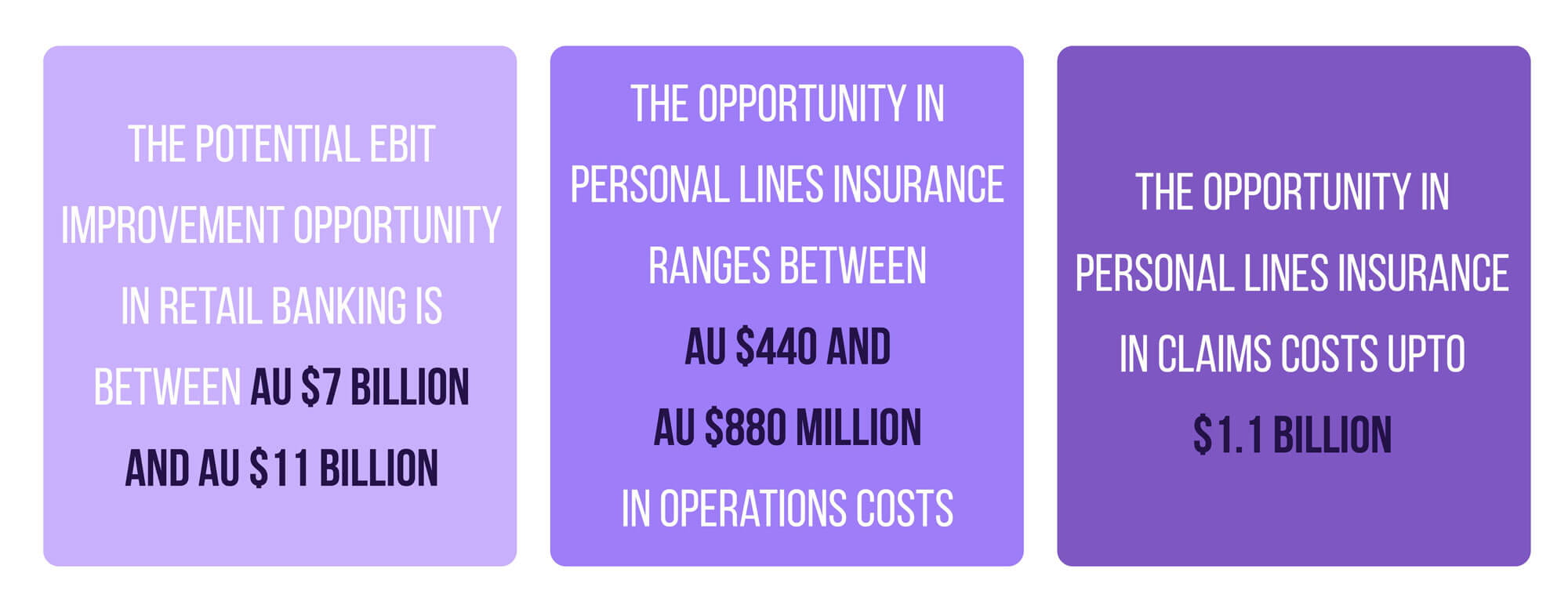
While the Banking and Insurance Sectors have been at the Forefront of Digitization, there is still room to expand Digital Service and Sales, use Advanced Analytics, particularly in Risk Management, and Reinvent Traditional Products using New Technologies like Telematics.
The potential EBIT (Earnings before Interest and Taxes) improvement opportunity in Retail Banking is between AU $7 billion and AU $11 billion. In the personal lines Insurance, the growth potential provides the opportunity to increase value by as much as AU $440 and AU $880 million. This could be done by reducing operations costs and as much as AU $1.1 billion in claims costs.
Metals & Mining
Energy and Utilities Sector
Arts and Culture
Property Management Sector
We all know that Real Estate is the Largest Asset Class in the World, trumping the value of all Stocks and Bonds combined. Australians are also known for their obsession with Homeownership, with more than 2 million owning an Investment Property. Property Managers are used by 80% of these Property Owners.
Despite this, the Industry NPS (Net Promoter Score), a metric used to Measure Customer Satisfaction, is as low as -38. So, despite a Massive Market, Customer Satisfaction is incredibly low. This phenomenon is largely due to resistance to change.
I have witnessed Technology disrupting and reshaping the entire Property Management Industry over the last two decades. Back then, paperwork was done by hand. Property Managers were overloaded, with some even managing up to 100 Properties. Property Owners faced a lack of transparency, with percentage-based fees implying that different owners are charged different prices for the same service.
i4T Global removes all the common pain points Property Occupants and Property Managers face, which can only be done with people who care, and Technology that Streamlines Processes
Wrapping Up
Today, Australia has pockets of Outstanding Digital Performance, Ranging from World-Class Mobile Banking Engagement to World-Class Mining Automation Deployment
Takeaways
(A)We’re so excited to share with you, i4T Global is one of the major sponsors of the 13th Annual Field Service Management (FSM) 2022 Conference, that’s happening on 09 – 10 March, and we will be in person at Dockside Darling Harbour in Sydney, Australia!
At this Year’s Event, we will equip you with the Strategies & Best Practices you need to Deliver an Effective Field Service Culture to Increase Efficiency & ROI of the Field Service Workforce While Improving Your Business Processes Through Real-Time Data-Driven Solutions.
(B) To stay updated with Latest Trends, Marketing Strategies, and Business Tips, follow i4T Global on Facebook, LinkedIn, and Twitter.
Hot off the press!

With our cutting-edge technology and in-depth knowledge of how the Field Service Management sector operates, the i4TGlobal Team loves to share industry insights to help streamline your business processes and generate new leads. We are driven by innovation and are passionate about delivering solutions that are transparent, compliant, efficient and safe for all stakeholders and across all touch points.
